How Artificial Intelligence Changes Job Market
VerifiedAdded on 2023/04/24
|9
|2414
|419
AI Summary
This article discusses the impact of Artificial Intelligence on the job market. It covers the advantages and disadvantages of AI in the workforce, including streamlining the process of job search, augmentation of numerous jobs, creating various jobs in numerous fields, and more.
Contribute Materials
Your contribution can guide someone’s learning journey. Share your
documents today.
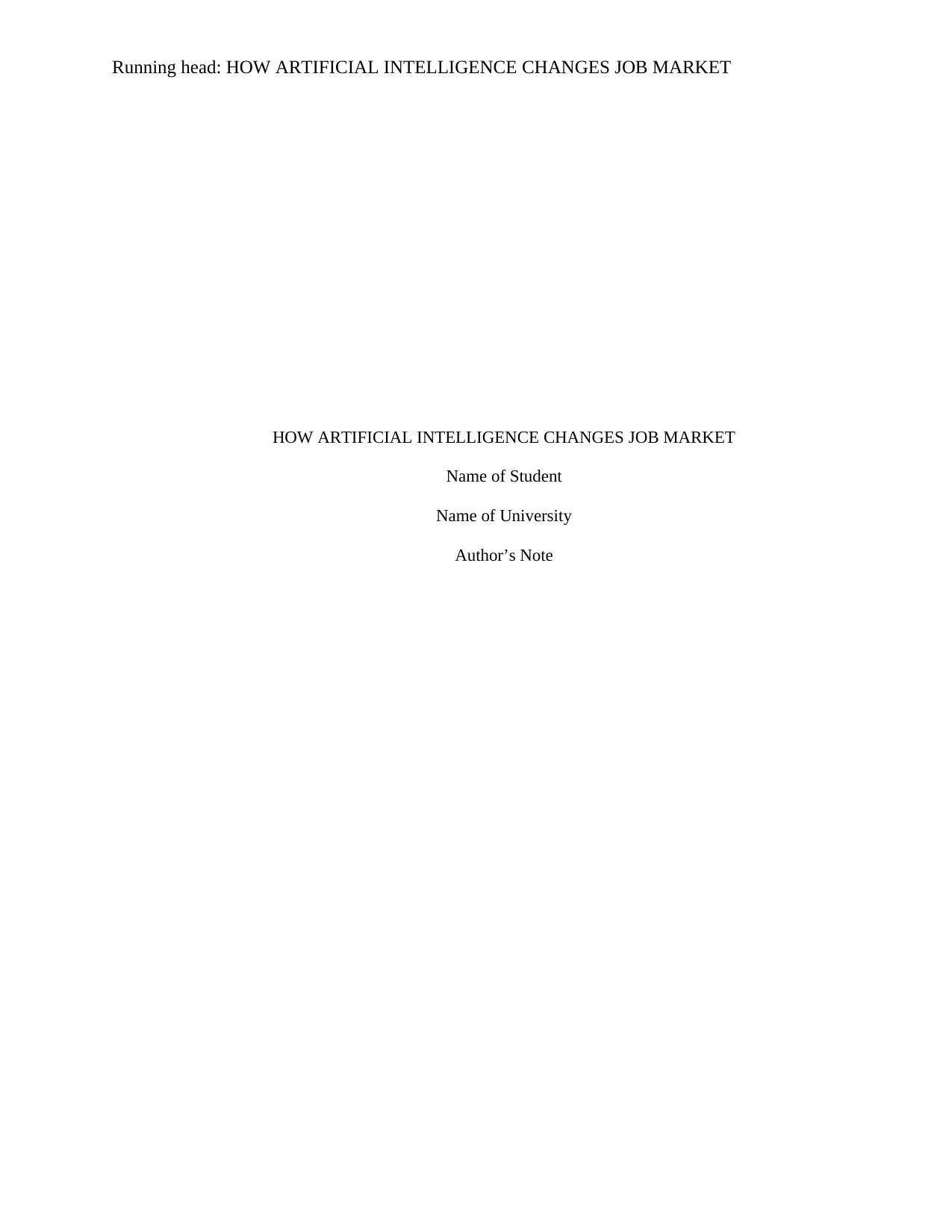
Running head: HOW ARTIFICIAL INTELLIGENCE CHANGES JOB MARKET
HOW ARTIFICIAL INTELLIGENCE CHANGES JOB MARKET
Name of Student
Name of University
Author’s Note
HOW ARTIFICIAL INTELLIGENCE CHANGES JOB MARKET
Name of Student
Name of University
Author’s Note
Secure Best Marks with AI Grader
Need help grading? Try our AI Grader for instant feedback on your assignments.
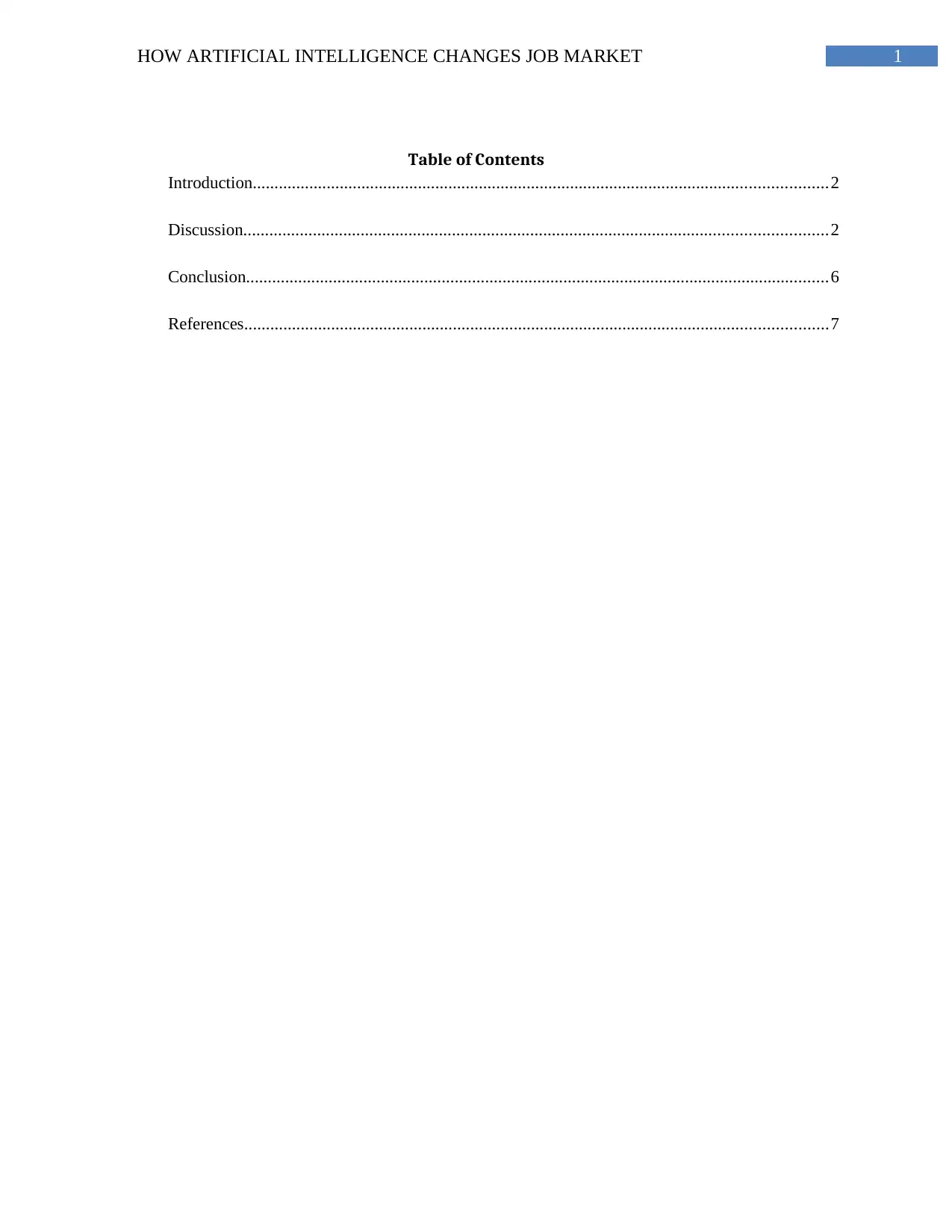
1HOW ARTIFICIAL INTELLIGENCE CHANGES JOB MARKET
Table of Contents
Introduction....................................................................................................................................2
Discussion......................................................................................................................................2
Conclusion......................................................................................................................................6
References......................................................................................................................................7
Table of Contents
Introduction....................................................................................................................................2
Discussion......................................................................................................................................2
Conclusion......................................................................................................................................6
References......................................................................................................................................7
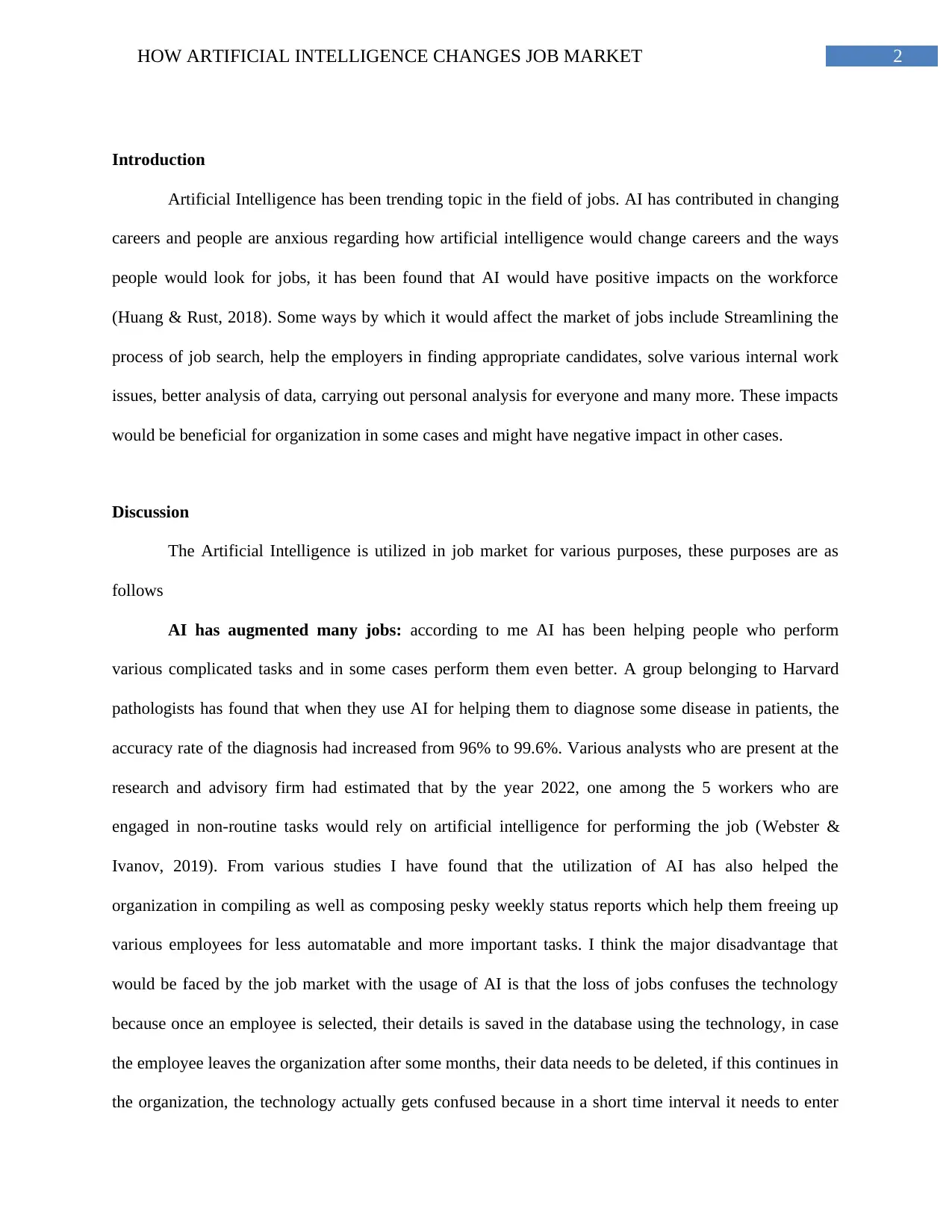
2HOW ARTIFICIAL INTELLIGENCE CHANGES JOB MARKET
Introduction
Artificial Intelligence has been trending topic in the field of jobs. AI has contributed in changing
careers and people are anxious regarding how artificial intelligence would change careers and the ways
people would look for jobs, it has been found that AI would have positive impacts on the workforce
(Huang & Rust, 2018). Some ways by which it would affect the market of jobs include Streamlining the
process of job search, help the employers in finding appropriate candidates, solve various internal work
issues, better analysis of data, carrying out personal analysis for everyone and many more. These impacts
would be beneficial for organization in some cases and might have negative impact in other cases.
Discussion
The Artificial Intelligence is utilized in job market for various purposes, these purposes are as
follows
AI has augmented many jobs: according to me AI has been helping people who perform
various complicated tasks and in some cases perform them even better. A group belonging to Harvard
pathologists has found that when they use AI for helping them to diagnose some disease in patients, the
accuracy rate of the diagnosis had increased from 96% to 99.6%. Various analysts who are present at the
research and advisory firm had estimated that by the year 2022, one among the 5 workers who are
engaged in non-routine tasks would rely on artificial intelligence for performing the job (Webster &
Ivanov, 2019). From various studies I have found that the utilization of AI has also helped the
organization in compiling as well as composing pesky weekly status reports which help them freeing up
various employees for less automatable and more important tasks. I think the major disadvantage that
would be faced by the job market with the usage of AI is that the loss of jobs confuses the technology
because once an employee is selected, their details is saved in the database using the technology, in case
the employee leaves the organization after some months, their data needs to be deleted, if this continues in
the organization, the technology actually gets confused because in a short time interval it needs to enter
Introduction
Artificial Intelligence has been trending topic in the field of jobs. AI has contributed in changing
careers and people are anxious regarding how artificial intelligence would change careers and the ways
people would look for jobs, it has been found that AI would have positive impacts on the workforce
(Huang & Rust, 2018). Some ways by which it would affect the market of jobs include Streamlining the
process of job search, help the employers in finding appropriate candidates, solve various internal work
issues, better analysis of data, carrying out personal analysis for everyone and many more. These impacts
would be beneficial for organization in some cases and might have negative impact in other cases.
Discussion
The Artificial Intelligence is utilized in job market for various purposes, these purposes are as
follows
AI has augmented many jobs: according to me AI has been helping people who perform
various complicated tasks and in some cases perform them even better. A group belonging to Harvard
pathologists has found that when they use AI for helping them to diagnose some disease in patients, the
accuracy rate of the diagnosis had increased from 96% to 99.6%. Various analysts who are present at the
research and advisory firm had estimated that by the year 2022, one among the 5 workers who are
engaged in non-routine tasks would rely on artificial intelligence for performing the job (Webster &
Ivanov, 2019). From various studies I have found that the utilization of AI has also helped the
organization in compiling as well as composing pesky weekly status reports which help them freeing up
various employees for less automatable and more important tasks. I think the major disadvantage that
would be faced by the job market with the usage of AI is that the loss of jobs confuses the technology
because once an employee is selected, their details is saved in the database using the technology, in case
the employee leaves the organization after some months, their data needs to be deleted, if this continues in
the organization, the technology actually gets confused because in a short time interval it needs to enter
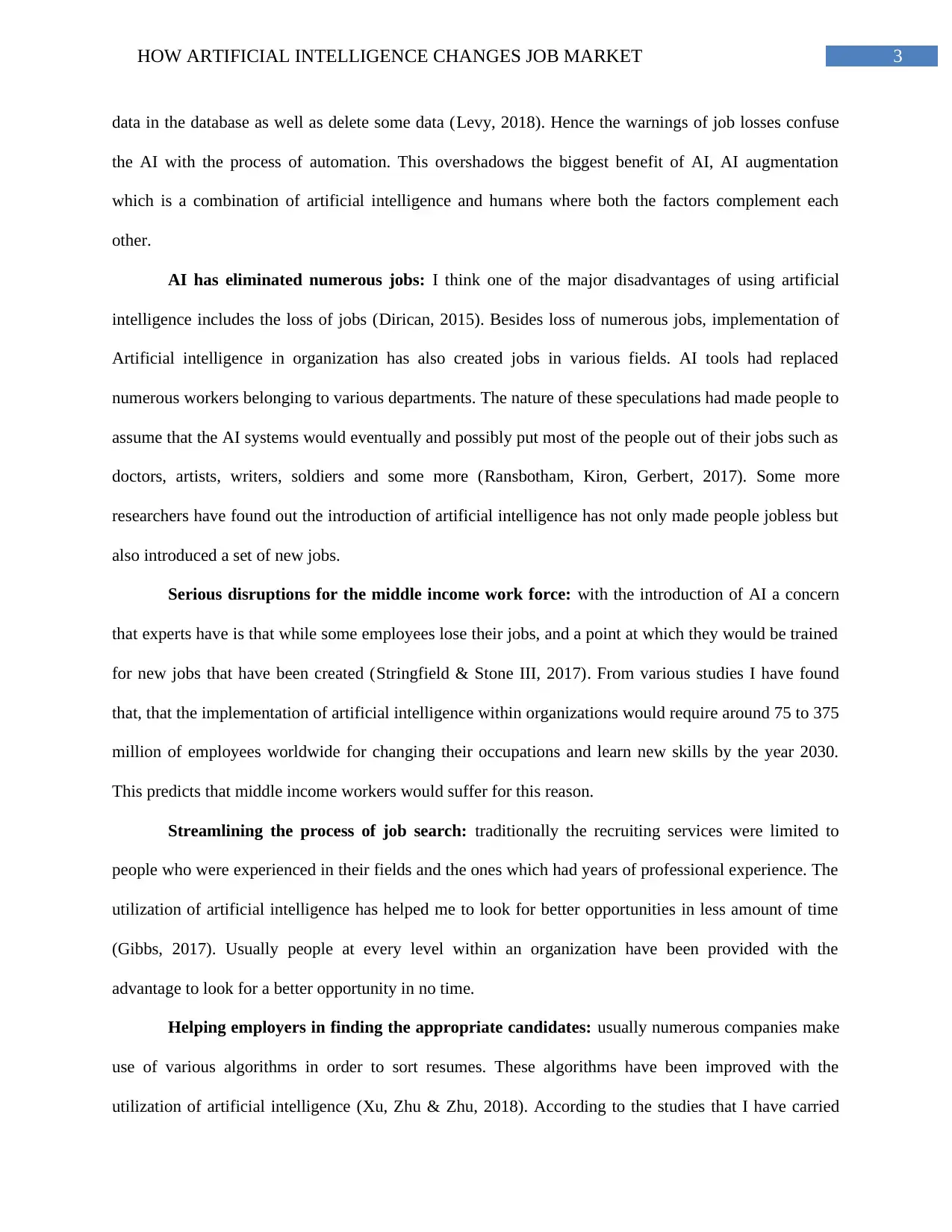
3HOW ARTIFICIAL INTELLIGENCE CHANGES JOB MARKET
data in the database as well as delete some data (Levy, 2018). Hence the warnings of job losses confuse
the AI with the process of automation. This overshadows the biggest benefit of AI, AI augmentation
which is a combination of artificial intelligence and humans where both the factors complement each
other.
AI has eliminated numerous jobs: I think one of the major disadvantages of using artificial
intelligence includes the loss of jobs (Dirican, 2015). Besides loss of numerous jobs, implementation of
Artificial intelligence in organization has also created jobs in various fields. AI tools had replaced
numerous workers belonging to various departments. The nature of these speculations had made people to
assume that the AI systems would eventually and possibly put most of the people out of their jobs such as
doctors, artists, writers, soldiers and some more (Ransbotham, Kiron, Gerbert, 2017). Some more
researchers have found out the introduction of artificial intelligence has not only made people jobless but
also introduced a set of new jobs.
Serious disruptions for the middle income work force: with the introduction of AI a concern
that experts have is that while some employees lose their jobs, and a point at which they would be trained
for new jobs that have been created (Stringfield & Stone III, 2017). From various studies I have found
that, that the implementation of artificial intelligence within organizations would require around 75 to 375
million of employees worldwide for changing their occupations and learn new skills by the year 2030.
This predicts that middle income workers would suffer for this reason.
Streamlining the process of job search: traditionally the recruiting services were limited to
people who were experienced in their fields and the ones which had years of professional experience. The
utilization of artificial intelligence has helped me to look for better opportunities in less amount of time
(Gibbs, 2017). Usually people at every level within an organization have been provided with the
advantage to look for a better opportunity in no time.
Helping employers in finding the appropriate candidates: usually numerous companies make
use of various algorithms in order to sort resumes. These algorithms have been improved with the
utilization of artificial intelligence (Xu, Zhu & Zhu, 2018). According to the studies that I have carried
data in the database as well as delete some data (Levy, 2018). Hence the warnings of job losses confuse
the AI with the process of automation. This overshadows the biggest benefit of AI, AI augmentation
which is a combination of artificial intelligence and humans where both the factors complement each
other.
AI has eliminated numerous jobs: I think one of the major disadvantages of using artificial
intelligence includes the loss of jobs (Dirican, 2015). Besides loss of numerous jobs, implementation of
Artificial intelligence in organization has also created jobs in various fields. AI tools had replaced
numerous workers belonging to various departments. The nature of these speculations had made people to
assume that the AI systems would eventually and possibly put most of the people out of their jobs such as
doctors, artists, writers, soldiers and some more (Ransbotham, Kiron, Gerbert, 2017). Some more
researchers have found out the introduction of artificial intelligence has not only made people jobless but
also introduced a set of new jobs.
Serious disruptions for the middle income work force: with the introduction of AI a concern
that experts have is that while some employees lose their jobs, and a point at which they would be trained
for new jobs that have been created (Stringfield & Stone III, 2017). From various studies I have found
that, that the implementation of artificial intelligence within organizations would require around 75 to 375
million of employees worldwide for changing their occupations and learn new skills by the year 2030.
This predicts that middle income workers would suffer for this reason.
Streamlining the process of job search: traditionally the recruiting services were limited to
people who were experienced in their fields and the ones which had years of professional experience. The
utilization of artificial intelligence has helped me to look for better opportunities in less amount of time
(Gibbs, 2017). Usually people at every level within an organization have been provided with the
advantage to look for a better opportunity in no time.
Helping employers in finding the appropriate candidates: usually numerous companies make
use of various algorithms in order to sort resumes. These algorithms have been improved with the
utilization of artificial intelligence (Xu, Zhu & Zhu, 2018). According to the studies that I have carried
Secure Best Marks with AI Grader
Need help grading? Try our AI Grader for instant feedback on your assignments.
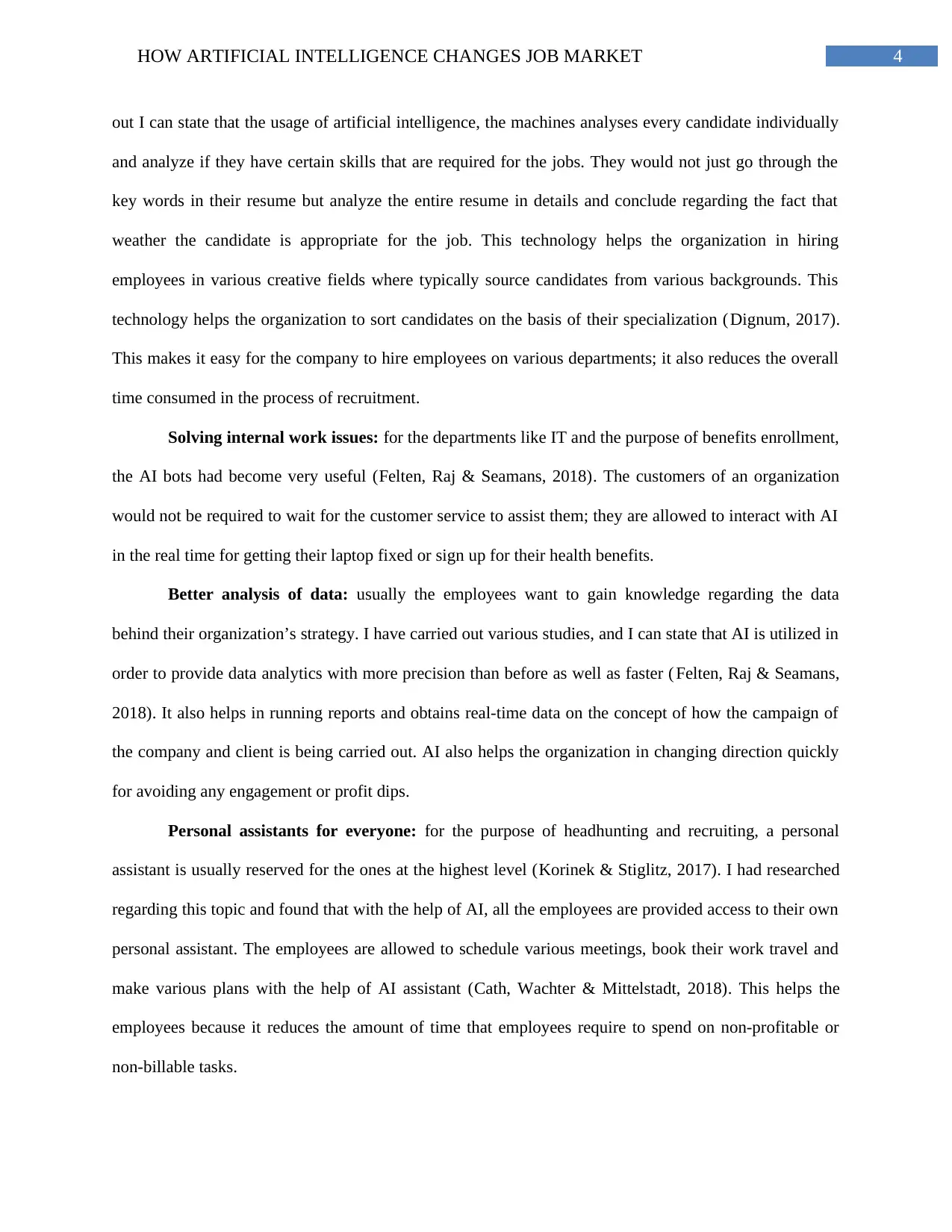
4HOW ARTIFICIAL INTELLIGENCE CHANGES JOB MARKET
out I can state that the usage of artificial intelligence, the machines analyses every candidate individually
and analyze if they have certain skills that are required for the jobs. They would not just go through the
key words in their resume but analyze the entire resume in details and conclude regarding the fact that
weather the candidate is appropriate for the job. This technology helps the organization in hiring
employees in various creative fields where typically source candidates from various backgrounds. This
technology helps the organization to sort candidates on the basis of their specialization ( Dignum, 2017).
This makes it easy for the company to hire employees on various departments; it also reduces the overall
time consumed in the process of recruitment.
Solving internal work issues: for the departments like IT and the purpose of benefits enrollment,
the AI bots had become very useful (Felten, Raj & Seamans, 2018). The customers of an organization
would not be required to wait for the customer service to assist them; they are allowed to interact with AI
in the real time for getting their laptop fixed or sign up for their health benefits.
Better analysis of data: usually the employees want to gain knowledge regarding the data
behind their organization’s strategy. I have carried out various studies, and I can state that AI is utilized in
order to provide data analytics with more precision than before as well as faster ( Felten, Raj & Seamans,
2018). It also helps in running reports and obtains real-time data on the concept of how the campaign of
the company and client is being carried out. AI also helps the organization in changing direction quickly
for avoiding any engagement or profit dips.
Personal assistants for everyone: for the purpose of headhunting and recruiting, a personal
assistant is usually reserved for the ones at the highest level (Korinek & Stiglitz, 2017). I had researched
regarding this topic and found that with the help of AI, all the employees are provided access to their own
personal assistant. The employees are allowed to schedule various meetings, book their work travel and
make various plans with the help of AI assistant (Cath, Wachter & Mittelstadt, 2018). This helps the
employees because it reduces the amount of time that employees require to spend on non-profitable or
non-billable tasks.
out I can state that the usage of artificial intelligence, the machines analyses every candidate individually
and analyze if they have certain skills that are required for the jobs. They would not just go through the
key words in their resume but analyze the entire resume in details and conclude regarding the fact that
weather the candidate is appropriate for the job. This technology helps the organization in hiring
employees in various creative fields where typically source candidates from various backgrounds. This
technology helps the organization to sort candidates on the basis of their specialization ( Dignum, 2017).
This makes it easy for the company to hire employees on various departments; it also reduces the overall
time consumed in the process of recruitment.
Solving internal work issues: for the departments like IT and the purpose of benefits enrollment,
the AI bots had become very useful (Felten, Raj & Seamans, 2018). The customers of an organization
would not be required to wait for the customer service to assist them; they are allowed to interact with AI
in the real time for getting their laptop fixed or sign up for their health benefits.
Better analysis of data: usually the employees want to gain knowledge regarding the data
behind their organization’s strategy. I have carried out various studies, and I can state that AI is utilized in
order to provide data analytics with more precision than before as well as faster ( Felten, Raj & Seamans,
2018). It also helps in running reports and obtains real-time data on the concept of how the campaign of
the company and client is being carried out. AI also helps the organization in changing direction quickly
for avoiding any engagement or profit dips.
Personal assistants for everyone: for the purpose of headhunting and recruiting, a personal
assistant is usually reserved for the ones at the highest level (Korinek & Stiglitz, 2017). I had researched
regarding this topic and found that with the help of AI, all the employees are provided access to their own
personal assistant. The employees are allowed to schedule various meetings, book their work travel and
make various plans with the help of AI assistant (Cath, Wachter & Mittelstadt, 2018). This helps the
employees because it reduces the amount of time that employees require to spend on non-profitable or
non-billable tasks.
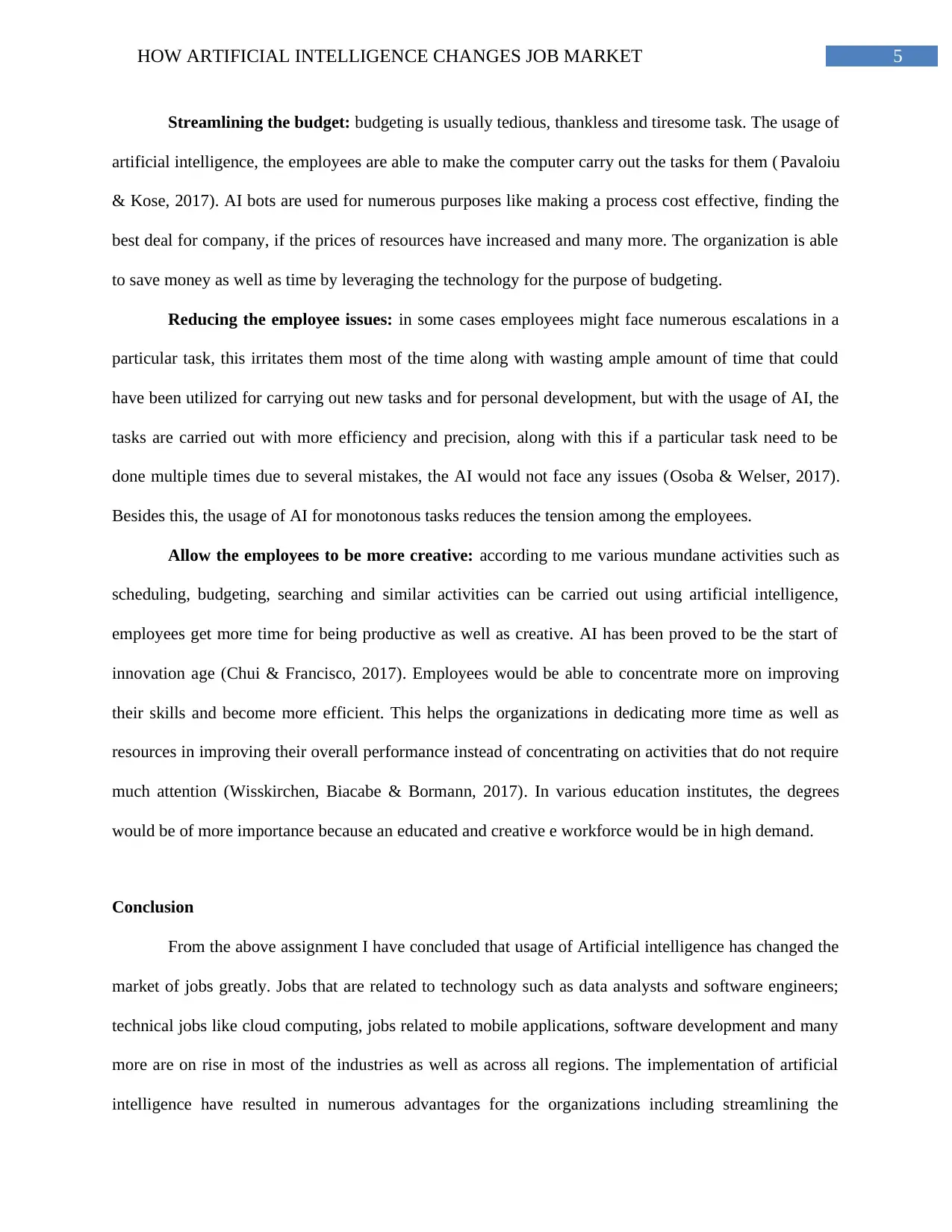
5HOW ARTIFICIAL INTELLIGENCE CHANGES JOB MARKET
Streamlining the budget: budgeting is usually tedious, thankless and tiresome task. The usage of
artificial intelligence, the employees are able to make the computer carry out the tasks for them ( Pavaloiu
& Kose, 2017). AI bots are used for numerous purposes like making a process cost effective, finding the
best deal for company, if the prices of resources have increased and many more. The organization is able
to save money as well as time by leveraging the technology for the purpose of budgeting.
Reducing the employee issues: in some cases employees might face numerous escalations in a
particular task, this irritates them most of the time along with wasting ample amount of time that could
have been utilized for carrying out new tasks and for personal development, but with the usage of AI, the
tasks are carried out with more efficiency and precision, along with this if a particular task need to be
done multiple times due to several mistakes, the AI would not face any issues (Osoba & Welser, 2017).
Besides this, the usage of AI for monotonous tasks reduces the tension among the employees.
Allow the employees to be more creative: according to me various mundane activities such as
scheduling, budgeting, searching and similar activities can be carried out using artificial intelligence,
employees get more time for being productive as well as creative. AI has been proved to be the start of
innovation age (Chui & Francisco, 2017). Employees would be able to concentrate more on improving
their skills and become more efficient. This helps the organizations in dedicating more time as well as
resources in improving their overall performance instead of concentrating on activities that do not require
much attention (Wisskirchen, Biacabe & Bormann, 2017). In various education institutes, the degrees
would be of more importance because an educated and creative e workforce would be in high demand.
Conclusion
From the above assignment I have concluded that usage of Artificial intelligence has changed the
market of jobs greatly. Jobs that are related to technology such as data analysts and software engineers;
technical jobs like cloud computing, jobs related to mobile applications, software development and many
more are on rise in most of the industries as well as across all regions. The implementation of artificial
intelligence have resulted in numerous advantages for the organizations including streamlining the
Streamlining the budget: budgeting is usually tedious, thankless and tiresome task. The usage of
artificial intelligence, the employees are able to make the computer carry out the tasks for them ( Pavaloiu
& Kose, 2017). AI bots are used for numerous purposes like making a process cost effective, finding the
best deal for company, if the prices of resources have increased and many more. The organization is able
to save money as well as time by leveraging the technology for the purpose of budgeting.
Reducing the employee issues: in some cases employees might face numerous escalations in a
particular task, this irritates them most of the time along with wasting ample amount of time that could
have been utilized for carrying out new tasks and for personal development, but with the usage of AI, the
tasks are carried out with more efficiency and precision, along with this if a particular task need to be
done multiple times due to several mistakes, the AI would not face any issues (Osoba & Welser, 2017).
Besides this, the usage of AI for monotonous tasks reduces the tension among the employees.
Allow the employees to be more creative: according to me various mundane activities such as
scheduling, budgeting, searching and similar activities can be carried out using artificial intelligence,
employees get more time for being productive as well as creative. AI has been proved to be the start of
innovation age (Chui & Francisco, 2017). Employees would be able to concentrate more on improving
their skills and become more efficient. This helps the organizations in dedicating more time as well as
resources in improving their overall performance instead of concentrating on activities that do not require
much attention (Wisskirchen, Biacabe & Bormann, 2017). In various education institutes, the degrees
would be of more importance because an educated and creative e workforce would be in high demand.
Conclusion
From the above assignment I have concluded that usage of Artificial intelligence has changed the
market of jobs greatly. Jobs that are related to technology such as data analysts and software engineers;
technical jobs like cloud computing, jobs related to mobile applications, software development and many
more are on rise in most of the industries as well as across all regions. The implementation of artificial
intelligence have resulted in numerous advantages for the organizations including streamlining the
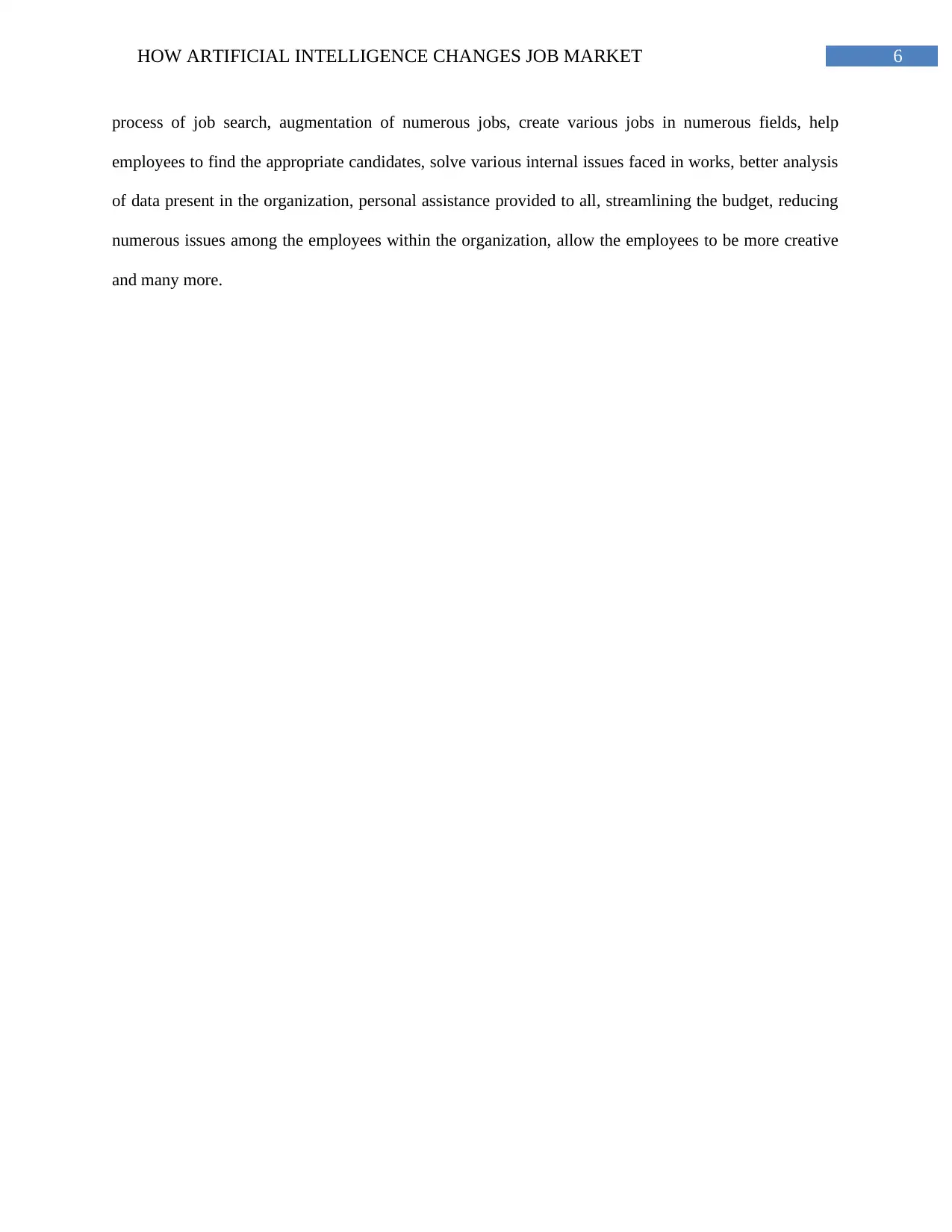
6HOW ARTIFICIAL INTELLIGENCE CHANGES JOB MARKET
process of job search, augmentation of numerous jobs, create various jobs in numerous fields, help
employees to find the appropriate candidates, solve various internal issues faced in works, better analysis
of data present in the organization, personal assistance provided to all, streamlining the budget, reducing
numerous issues among the employees within the organization, allow the employees to be more creative
and many more.
process of job search, augmentation of numerous jobs, create various jobs in numerous fields, help
employees to find the appropriate candidates, solve various internal issues faced in works, better analysis
of data present in the organization, personal assistance provided to all, streamlining the budget, reducing
numerous issues among the employees within the organization, allow the employees to be more creative
and many more.
Paraphrase This Document
Need a fresh take? Get an instant paraphrase of this document with our AI Paraphraser
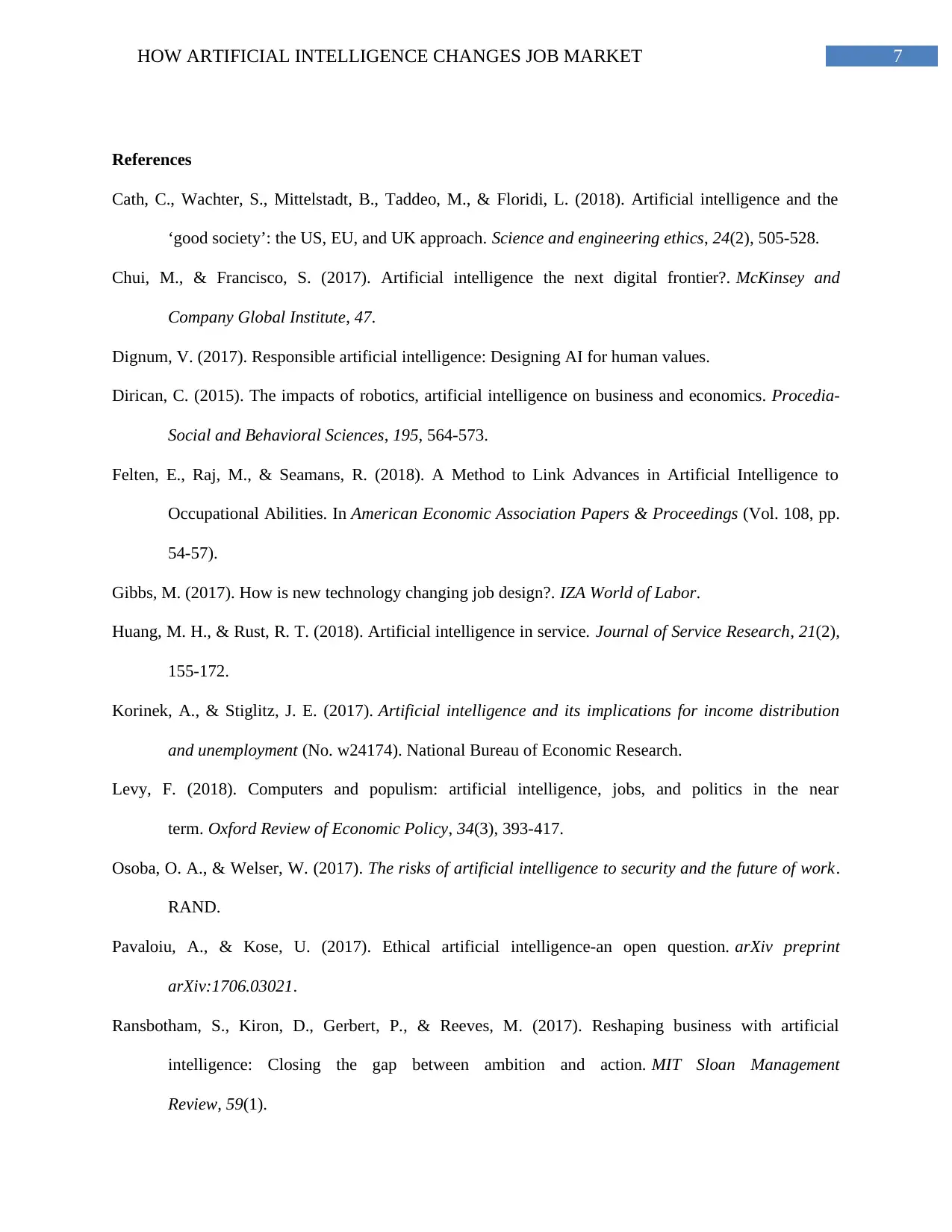
7HOW ARTIFICIAL INTELLIGENCE CHANGES JOB MARKET
References
Cath, C., Wachter, S., Mittelstadt, B., Taddeo, M., & Floridi, L. (2018). Artificial intelligence and the
‘good society’: the US, EU, and UK approach. Science and engineering ethics, 24(2), 505-528.
Chui, M., & Francisco, S. (2017). Artificial intelligence the next digital frontier?. McKinsey and
Company Global Institute, 47.
Dignum, V. (2017). Responsible artificial intelligence: Designing AI for human values.
Dirican, C. (2015). The impacts of robotics, artificial intelligence on business and economics. Procedia-
Social and Behavioral Sciences, 195, 564-573.
Felten, E., Raj, M., & Seamans, R. (2018). A Method to Link Advances in Artificial Intelligence to
Occupational Abilities. In American Economic Association Papers & Proceedings (Vol. 108, pp.
54-57).
Gibbs, M. (2017). How is new technology changing job design?. IZA World of Labor.
Huang, M. H., & Rust, R. T. (2018). Artificial intelligence in service. Journal of Service Research, 21(2),
155-172.
Korinek, A., & Stiglitz, J. E. (2017). Artificial intelligence and its implications for income distribution
and unemployment (No. w24174). National Bureau of Economic Research.
Levy, F. (2018). Computers and populism: artificial intelligence, jobs, and politics in the near
term. Oxford Review of Economic Policy, 34(3), 393-417.
Osoba, O. A., & Welser, W. (2017). The risks of artificial intelligence to security and the future of work.
RAND.
Pavaloiu, A., & Kose, U. (2017). Ethical artificial intelligence-an open question. arXiv preprint
arXiv:1706.03021.
Ransbotham, S., Kiron, D., Gerbert, P., & Reeves, M. (2017). Reshaping business with artificial
intelligence: Closing the gap between ambition and action. MIT Sloan Management
Review, 59(1).
References
Cath, C., Wachter, S., Mittelstadt, B., Taddeo, M., & Floridi, L. (2018). Artificial intelligence and the
‘good society’: the US, EU, and UK approach. Science and engineering ethics, 24(2), 505-528.
Chui, M., & Francisco, S. (2017). Artificial intelligence the next digital frontier?. McKinsey and
Company Global Institute, 47.
Dignum, V. (2017). Responsible artificial intelligence: Designing AI for human values.
Dirican, C. (2015). The impacts of robotics, artificial intelligence on business and economics. Procedia-
Social and Behavioral Sciences, 195, 564-573.
Felten, E., Raj, M., & Seamans, R. (2018). A Method to Link Advances in Artificial Intelligence to
Occupational Abilities. In American Economic Association Papers & Proceedings (Vol. 108, pp.
54-57).
Gibbs, M. (2017). How is new technology changing job design?. IZA World of Labor.
Huang, M. H., & Rust, R. T. (2018). Artificial intelligence in service. Journal of Service Research, 21(2),
155-172.
Korinek, A., & Stiglitz, J. E. (2017). Artificial intelligence and its implications for income distribution
and unemployment (No. w24174). National Bureau of Economic Research.
Levy, F. (2018). Computers and populism: artificial intelligence, jobs, and politics in the near
term. Oxford Review of Economic Policy, 34(3), 393-417.
Osoba, O. A., & Welser, W. (2017). The risks of artificial intelligence to security and the future of work.
RAND.
Pavaloiu, A., & Kose, U. (2017). Ethical artificial intelligence-an open question. arXiv preprint
arXiv:1706.03021.
Ransbotham, S., Kiron, D., Gerbert, P., & Reeves, M. (2017). Reshaping business with artificial
intelligence: Closing the gap between ambition and action. MIT Sloan Management
Review, 59(1).
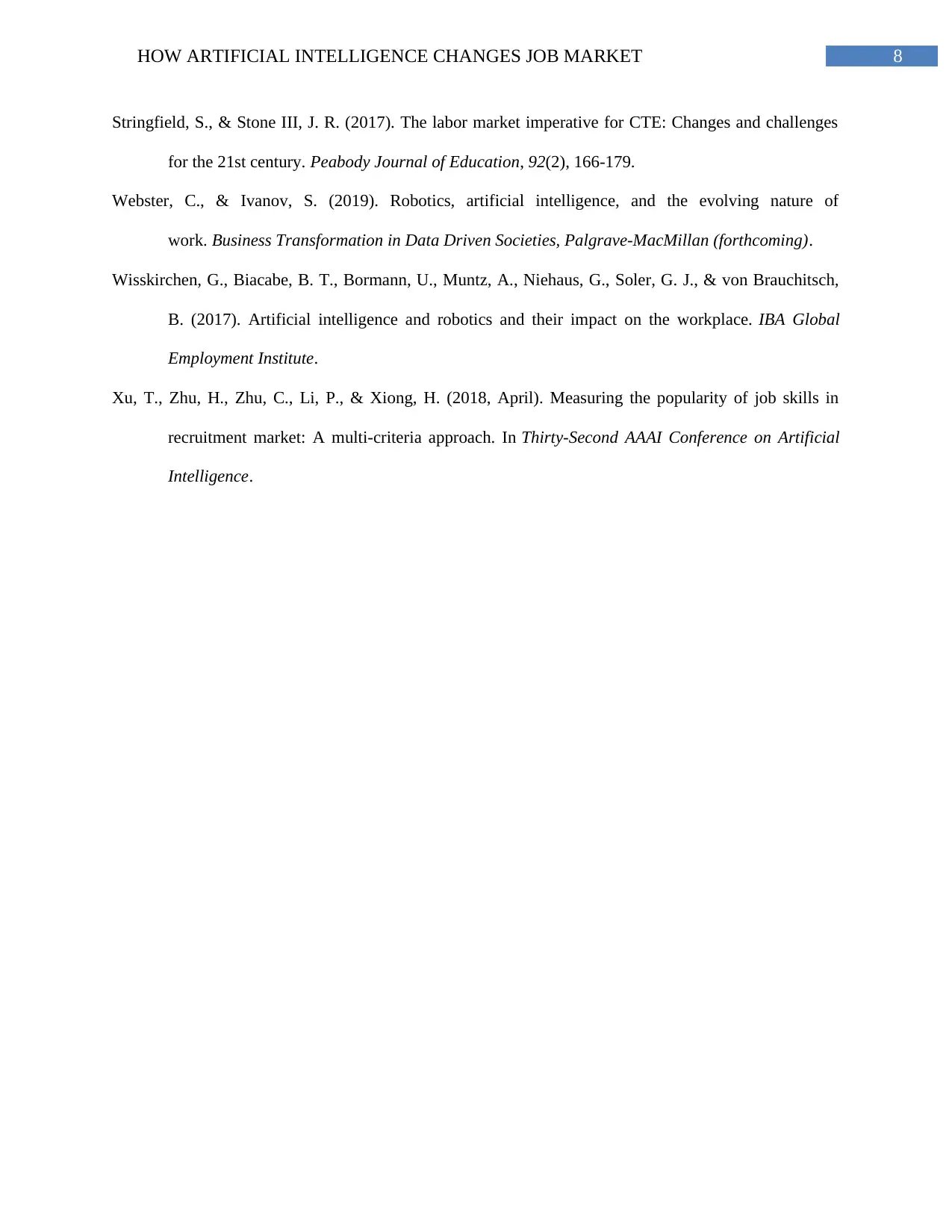
8HOW ARTIFICIAL INTELLIGENCE CHANGES JOB MARKET
Stringfield, S., & Stone III, J. R. (2017). The labor market imperative for CTE: Changes and challenges
for the 21st century. Peabody Journal of Education, 92(2), 166-179.
Webster, C., & Ivanov, S. (2019). Robotics, artificial intelligence, and the evolving nature of
work. Business Transformation in Data Driven Societies, Palgrave-MacMillan (forthcoming).
Wisskirchen, G., Biacabe, B. T., Bormann, U., Muntz, A., Niehaus, G., Soler, G. J., & von Brauchitsch,
B. (2017). Artificial intelligence and robotics and their impact on the workplace. IBA Global
Employment Institute.
Xu, T., Zhu, H., Zhu, C., Li, P., & Xiong, H. (2018, April). Measuring the popularity of job skills in
recruitment market: A multi-criteria approach. In Thirty-Second AAAI Conference on Artificial
Intelligence.
Stringfield, S., & Stone III, J. R. (2017). The labor market imperative for CTE: Changes and challenges
for the 21st century. Peabody Journal of Education, 92(2), 166-179.
Webster, C., & Ivanov, S. (2019). Robotics, artificial intelligence, and the evolving nature of
work. Business Transformation in Data Driven Societies, Palgrave-MacMillan (forthcoming).
Wisskirchen, G., Biacabe, B. T., Bormann, U., Muntz, A., Niehaus, G., Soler, G. J., & von Brauchitsch,
B. (2017). Artificial intelligence and robotics and their impact on the workplace. IBA Global
Employment Institute.
Xu, T., Zhu, H., Zhu, C., Li, P., & Xiong, H. (2018, April). Measuring the popularity of job skills in
recruitment market: A multi-criteria approach. In Thirty-Second AAAI Conference on Artificial
Intelligence.
1 out of 9
![[object Object]](/_next/static/media/star-bottom.7253800d.svg)





